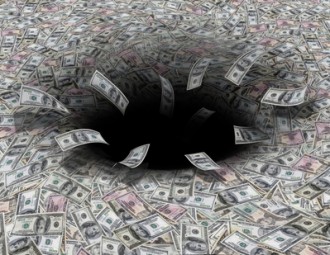Leu Marholin: We are heading full speed to the new nineties

Regression of the Belarusian economy combined with the inertness of the government will make us recall the worst years.
The latest National Bank statistics shows that the Belarusians are struggling to maintain their pre-crisis way of life and sacrifice quantity for the sake of quality i.e. they spend their foreign currency deposits. The fixed-term foreign currency deposits of the population have reached a total of 7 billion 197 million dollars as for September 1. The deposits amount has been reduced by nearly $494.5 million compared to the beginning of the year. On the contrary, ruble deposits share has slightly increased compared to the beginning of the year: including the accrued interest it has grown by 1.8%. As early as this summer when speaking about the tendency, Dmitry Murin, head of the Monetary Policy and Economic Analysis Directorate of the National Bank stated: "Whilst there is a significant decline in the income rate the population keeps its consumption habit."
In his interview with “EuroBelarus” Information Service, the economist Leu Marholin noted that "of course, the opinion of the National Bank expert is right. Unlike the ruble deposits our foreign currency deposits have never pursued the goal of income increase, they were always kept, let us say, for stability reasons, that is, their goal was savings protection. And now, when the economic situation is deteriorating rapidly, people are forced to use this stability guarantor to maintain the standard of living they got accustomed to during the rather successful years for the Belarusian economy. As for the ruble deposits, their increase shows that they are still considered as a way to boost income; in the declining-inflation environment even 16% per annum rate is regarded as quite a reasonable option for getting extra income".
The economist estimates "two, maximum three years until the pockets of the population get completely empty" if the current state economic strategy maintains.
Leu Marholin believes that “we can talk about the return of the nineties in the near future, but still there are some significant differences. The nineties will come again but not for everyone. After all many people have learned to work for themselves during this time, they have independent businesses to earn their living and provide for their family. I don’t think such a bewilderment and helplessness as after the Soviet Union collapse will take place. Moreover people are no longer afraid of job-hunting abroad. They have learned to be self-reliant since there is no hope coming from state. So I presume there will not be such poverty as in the 90s because people have changed. "
As for the hopes for foreign aid such as IMF loan, Leu Marholin suggests that the probability of obtaining such loan has significantly increased. However, this money won’t reach people. "What has ever happened to the loans in Belarus? They were always spent on paying the external debt interest and paying back the debt itself. It’s true that the parliamentary elections results will undoubtedly move us closer to the positive decision on getting the IMF loan. But taking the previous experience into consideration, IMF will not give $ 3.5 billion we asked for. It will divide this amount in tranches of $300-400 million and check whether the IMF requirements are met. These demands are met by our National Bank only - tight monetary policy brings results. Nothing else has changed or is being done in our economy," –summed up Leu Marholin.
-
03.01
-
07.10
-
22.09
-
17.08
-
12.08
-
30.09










































